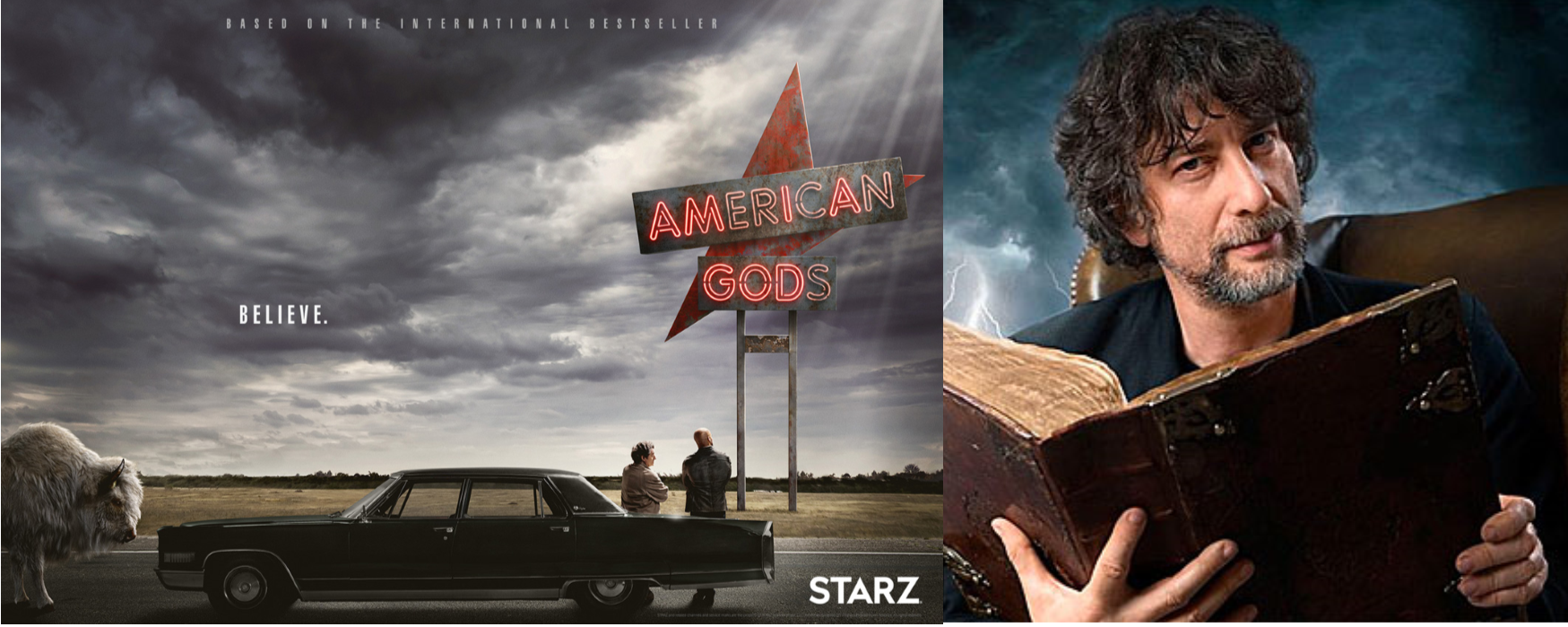Amanda Baldeneaux -- Uprooting Who We Were
Ever behind on all things cool, I have never read the original novel, American Gods, by Neil Gaiman. I went into the show’s premiere episode on Starz having just started the book, and I’m so fresh into the novel, Shadow isn’t even out of prison. The only two things I knew to expect from the show were “myths” and “road trip,” so I was a tabula rasa when the theme music began. The show opens with Vikings landing in North America and meeting a greeting party of well-aimed arrows from, presumably, Native Americans (we never see them). The Vikings leave behind a wooden icon of the All-Father, setting the backstory for how an international summit of deities made it to North America over the following centuries. The viewer and Shadow get glimpses of some of these deities, from a man-eating goddess to a tech-savvy bully, with lesser paranormals, like leprechauns, also hanging around the usual American haunts: gator-shaped bars. There’s a whole community of divine beings weaving their lives into the fabric of American society, each with individual agendas and grudges to sort out, collateral damage be damned.
Let the road trip begin! Ian McShane as a glorious Mr. Wednesday (Odin) and Ricky Whittle as Shadow Moon.
The novel and show highlight the immigrant experience, as well as the outsider experience. When immigrants traveled to the US with their faiths and folklores in tow, the faces of those religions and stories were stranded on foreign soil, left to grapple with a shifting cultural landscape and the assimilation of their flag bearers into a new, American culture that rendered their existences obsolete.
Shadow, a newly released convict, faces a similar challenge. The US is not kind to former felons, and Shadow knows he’ll have trouble securing a job and reintegrating into society. This trouble is compounded when he learns his wife has died in a car crash, removing his safety net that would have helped him reenter his previous life. When it rains it pours, and Shadow learns, at her funeral of all places, that she’d been unfaithful, meaning he’d become obsolete in her life as well as through her death. His odd new acquaintance, Mr. Wednesday, recognizes Shadow’s outsider status and knows he’s an obvious hire among the fringe figures of forgotten faiths and old-world folklore. He’ll fit right in.
I’m sure we’ll see, as the show continues, the “road trip” element, which is fitting, as a journey exists outside of the norm of everyday life and routine. When traveling, the root is severed, just as assimilated Americans severed their roots in first coming to the US, eventually forgetting where they came from and what they brought.
Uprooted and unbound by the expectations of “normal” life, I’m eager to see how Shadow evolves into his own person with strength of character and will. I only hope that his motivation is intrinsic and won’t all stem from the death of his wife. If there’s anything I’m over, it’s dead-women-motivating-men. There’s a tradition that can die.
Sean Cassity -- Filling out a Shadow
In a filmed adaptation of a book with as many fantastic elements as American Gods, fans are of course eager to see how the filmmakers render and interpret such over-the-top scenes as Bilquis consuming a man into her womb, and all the trips into other worlds and the afterlife. But the real challenge is how to make the protagonist, Shadow Moon, live on the screen in a way he never needed to on the page.
Shadow is an observer more than anything else. He journeys among these gods and discovers their rivalries and their mysteries because of the current that carries him along, not out of any great yearning or designs of his own. Shadow is a great name for him because he is not especially filled out. But the things happening around him are so damn intriguing, we don’t need him to be more than the plot blown automaton that he is – in the book. But when Shadow goes from the eyes we see through to the man the camera is pointed at, he needs to grow something he never needed before: a personality and a perspective of his own. He has too much screen time for Shadow to remain a shadow.
The team behind the Starz adaptation of American Gods do not see this as a problem, though. They want to present a straight, faithful adaption of the book. But their blank, stoic Shadow leaves their version feeling largely lifeless. Even with Ian McShane’s glorious Mr. Wednesday bringing such joyful devilry to his scenes, he is left acting against the wall of a quiet, smoldering Shadow. A living, motivated Shadow Moon is what the screen is begging for was we watch American Gods on Sunday nights, not more cross-processing, heavy shadows, and long lens close-ups. Not flashes of style in search of a clear vision, but a protagonist whose charm and behavior make us eager to see not just what happens around him, but what happens to him.
Lisa Mahoney -- Shadow Moon Embarks Upon His Heroic Journey
American Gods is the book that made me understand that fantasy and old mythology could be modernized in a hip, cool way. This is no bullied-kid-goes-to-magic school-while-pestered-by-farcical-gods kind of story; Shadow Moon is an adult who pays for a crime he never meant to be a part of while keeping his head down and doing his own time as the story begins. And yet, it is also a hero’s journey, and our hero is the one man who, unbeknownst to himself, can save our world. With his hustler hero’s journey “guide,” Odin/Mr. Wednesday, showing him the ropes, Shadow enters a crazy-dangerous hero’s “underworld” we never knew existed right here in America.
The book cover redesigned for the Starz show.
The story asks what it means to be a god, and who deserves worship. These old American gods are all immigrants, brought into existence by immigrant believers, but they grow weak as they are forgotten. In a dream Shadow visits a vast hall of gods that are so forgotten they’re not even in history books. When we stop believing in them, gods fade away, but before then, fickle and demanding as they are, they also serve their believers, as when a Cornish god leads one of his aging believers into a peaceful death. The proper relationship is a two-way street. Lord of Light examined a similar question in a science fictional setting where space travelers use high technology to act as gods and gradually come to love being worshipped, forcing one of them to lead an egalitarian revolt in the form of Buddhism.
As people universally need someone to worship, so they need to make pilgrimages to holy places of power. I imagine that Gaiman must have seen with a foreigner’s eye how odd roadside attractions are in America: houses on rocks, alligator and spider farms, sports Halls of Fame. We couldn’t import our ancestors’ ancient sacrificial stones, Stonehenge, or cave paintings, as Mr. Wednesday explains, and so we made new ones.
The villain in American Gods is god-like technology. Regular people have turned their back on the old gods to devote themselves to hardware and software, the internet and data. These new, brash, young gods are brutal, self-assured and powerful. Shadow is attacked by them before he knows what’s going on. (Here I quarrel with the TV show depiction of this episode: Shadow is beaten so badly that as a viewer I have to question why he would continue to work for Mr. Wednesday afterwards.) The real problem with technology, the story seems to suggest, is that for all we regular people devote ourselves to it, it gives too little back to deserve our worship.
Gemma Webster -- A TV Show By and For White Men?
I really wanted to love this show. I loved the book the first time I read it, and I still loved it when I reread it in anticipation of this show. The trailers for the show were great. The look and feel seemed right. The cast looked perfect. Ricky Whittle and Ian McShane were made for their roles. But the show is sluggish, except for the little god asides which perform a nice trick of giving a full mini-story inside the bigger episode. In the first of these god-minis, the show makes the biggest deviation from the novel. Story wise, I don’t mind the change in the show opening about the All-Father arriving in America. The new story arc sets up a nice parallel that will come into play much later, but I started to have a nagging feeling that something was off. Where were the Native American actors?
Mr. Nancy, the Caribbean trickster god, is played by Orlando Jones.
This is a story about the immigrant experience, so focusing on the white guys arriving in America is in line with the story’s aims, but the fact that we never see the faces, and thus no Native American actors were paid to participate, feels like erasure. I was willing to keep watching because after all, I know that there will be more actors of color coming, but it raised a flag for me.
The story of Shadow meeting Mr. Wednesday played out pretty much as it was written, and so for whatever problems may lie in there, my critical brain went dormant and didn’t notice. However, when we got to the Bilquis god-mini, the nagging feeling returned. Yetide Badaki is as powerful as she is beautiful. The actor is perfect, however, I’m not sure about the change of Bilquis from sex worker to Tinder user. In making that change, I felt like the showrunners avoided the hard parts of the story. Being a Tinder user is not the same level of desperation as a sex worker. The rest of the scene went much as expected.
In the interview afterward, it appears that everyone at Starz was anxious about how that scene would play out, but they did the scene just as written. The horny man is swallowed by Bilquis’ goddess vagina, and he loves it. A line from the interview encapsulates what I think is going wrong in this episode. In speaking about this scene in particular, Brian Fuller says, “We get to celebrate an empowerment of sexuality at the same time as we are creating this strange little horror movie for middle-aged white men.” The first part of the quote is fine. Sex should be empowering, and in this case an amazing black woman gets to have this power. I’m for it. It’s the lack of attribution of that empowerment combined with the second half of that reveals an imbedded sentiment of the writers. The majority of movies, horror or otherwise, have always been made for white men. That aim seems to me to fly in the face of what this story is trying to claim it is about as well as the audience they are seeking to attract. But, then again, all the writers are white men, so maybe we shouldn’t be so surprised that this first episode is a little bit more for white men than everyone else. As a woman, that scene hardly registers as horror but rather a nice way to die. Being swallowed whole by the mythic vagina dentata is far less horrific than an axe to the head. The rest of the season promises great things from actors of color. Check out Orlando Jones as Anansi. This scene gives me good hope that the show will make room for the horrors of others.














Fiction Unbound staff close the books for a night of adaptation television with Neil Gaiman's American Gods' premiere on Starz